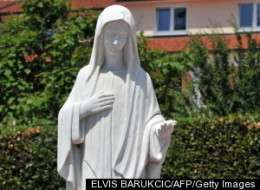Thursday, December 16, 2010
Neodance - Spiritual Dance of Old Europe
At the beginning of this video, a dancer is asked what she feels when she dances. "I feel the freedom of the wind," she answers, "power of the earth, flowing of the water, energy of the fire. and all that transfused in endless love."
The rest of the video shows a small group of dancers engaged in a set of simple dances representing respectively wind, earth, water, and fire. There certainly is energy in these classical elements and in bodily movement. Tai Chi focuses the flow of energies within and around our bodies, sometimes drawing on energies of the earth, water, and air. Christian body prayer uses movement and sometimes uses the elements of creation as focal points.
How do you experience spirituality through body movement? Do you experience an immanent spirituality of wind, earth, water, and fire? Do you experience a transcendent spirituality of something beyond?
Wednesday, December 15, 2010
The Importance of Mary's Virginity

"Texts from oppressed communitie
This week's episode of Religion and Ethics Newsweekly has a story about Jews in the Terezin concentrat
http://www
Read the Article at HuffingtonPost
December 10, 2010 ~ Defiant Requiem: Verdi at Terezin | Religion & Ethics NewsWeekly
December 10, 2010 ~ Defiant Requiem: Verdi at Terezin | Religion & Ethics NewsWeekly
A powerful instance of the truth of the arts and of religion, truth that was otherwise inexpressible.
A powerful instance of the truth of the arts and of religion, truth that was otherwise inexpressible.
The Importance of Mary's Virginity

I don't think myth and truth are mutually exclusive. There are many different forms taken by truth. Some forms of truth can be expressed propositio
The truth of art doesn't take a propositio
Narrative truth expresses truth of the human condition in a different way. In some ways, we find our own identity in the narratives that we hear and in those narratives that we tell.
20th-centu
About Christianity
Read the Article at HuffingtonPost
The Importance of Mary's Virginity

There is some evidence that some of the earliest Christian communitie
Your point about Constantin
About Christianity
Read the Article at HuffingtonPost
Subscribe to:
Posts (Atom)